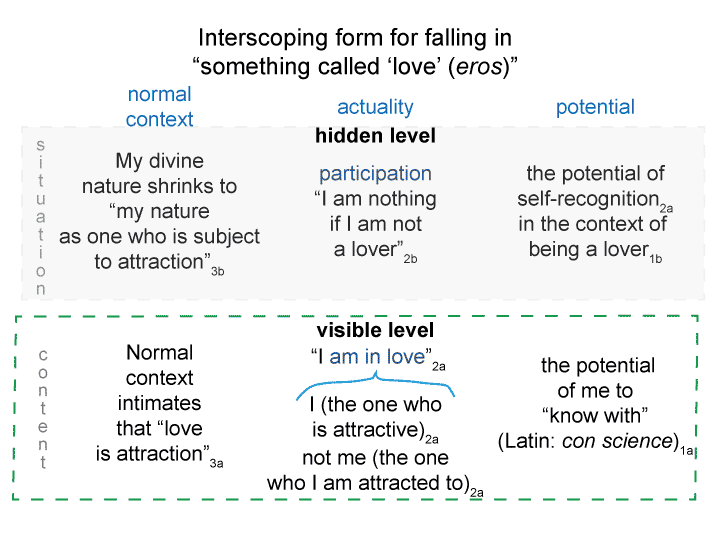Man and Sin by Piet Schoonenberg (1964) 2.2U-2
[What has the person not seen?
Perhaps, “she” has not seen the situation-level nested form. “She” has not seen how “her” divine nature situates “her” feelings of attraction. “She” becomes smaller. In modern terms, “she” objectifies “herself”. “Her” carnal expectations situates “her” feelings of attraction.
“She” does not sense “her” self-destruction.]
Man and Sin by Piet Schoonenberg (1964) 2.2U-1
Summary of text [comment] page 72
[The first is the interscoping nested form for ‘something called ‘love’.
Let me suppose that ‘love’ is ‘eros’.
The person sees the content-level, where “she” is attracted to “her” love. “She” loves being in love. “She” sees the erotic.]
Man and Sin by Piet Schoonenberg (1964) 2.2T
[To me, 1 John 4:20 calls to mind a question about the interscoping and intersecting nested forms:
Is one of the forms ‘visible’ and the other ‘hidden’?
Let me consider two examples.]
Man and Sin by Piet Schoonenberg (1964) 2.2S
Summary of text [comment] page 72
Schoonenberg quoted 1 John 4:20. If anyone says, “I love God”, yet hates his brother, he is a liar. He who does not love his brother whom he has seen cannot love God whom he has not seen.
Is ‘love for what we see’ intrinsic to ‘the love for what we do not see’? When we love our fellow human in his deepest reality, we love him, implicitly or explicitly, in God.
Man and Sin by Piet Schoonenberg (1964) 2.2R
Summary of text [comment] page 71
[In sum, ‘the idea of natural love’ is pure propaganda.
It moves the interpellated person away from what the human evolved to be.
Where does one see this idea propagated in contemporary society?
On television and in the movies?
In popular books and magazines?
Wake up.
Does anyone writing for popular television, movies, books and magazines suffer the consequences of misleading their consumers?
Let the buyer beware.
‘Natural love’ sells, just like perfume.]
Man and Sin by Piet Schoonenberg (1964) 2.2Q-2
[By extension, this also applies to agape.]
Schoonenberg asserted:
No love is possible on any level without conversion from sin. Without grace, a sinful man is incapable of any love, natural or supernatural.
Man and Sin by Piet Schoonenberg (1964) 2.2Q-1
[Another way to put that is:
‘Natural love (especially eros, the emphasis here) is an idol.
An idol is neither supernatural nor natural.]
Man and Sin by Piet Schoonenberg (1964) 2.2P-1
[Culture is the way that this takes place.
So what is the bottom line?
The concept of ‘natural attraction’, regarded from the point of view of human evolution, is not natural.
It does not encourage the male to be the female’s helper.
It does not provide a cultural motif through which the female anoints the male and puts him in charge.]
Man and Sin by Piet Schoonenberg (1964) 2.2P
Summary of text [comment] page 71
[A brief review of male-female pair bonding is in order.
The human male evolved to be the female’s helper.
This adaptation could not take place without assurance by the female of the male’s paternity of the children.
The female evolved a hard to fake behavior that provides this crucial assurance.
She put the male in charge of the family.]

